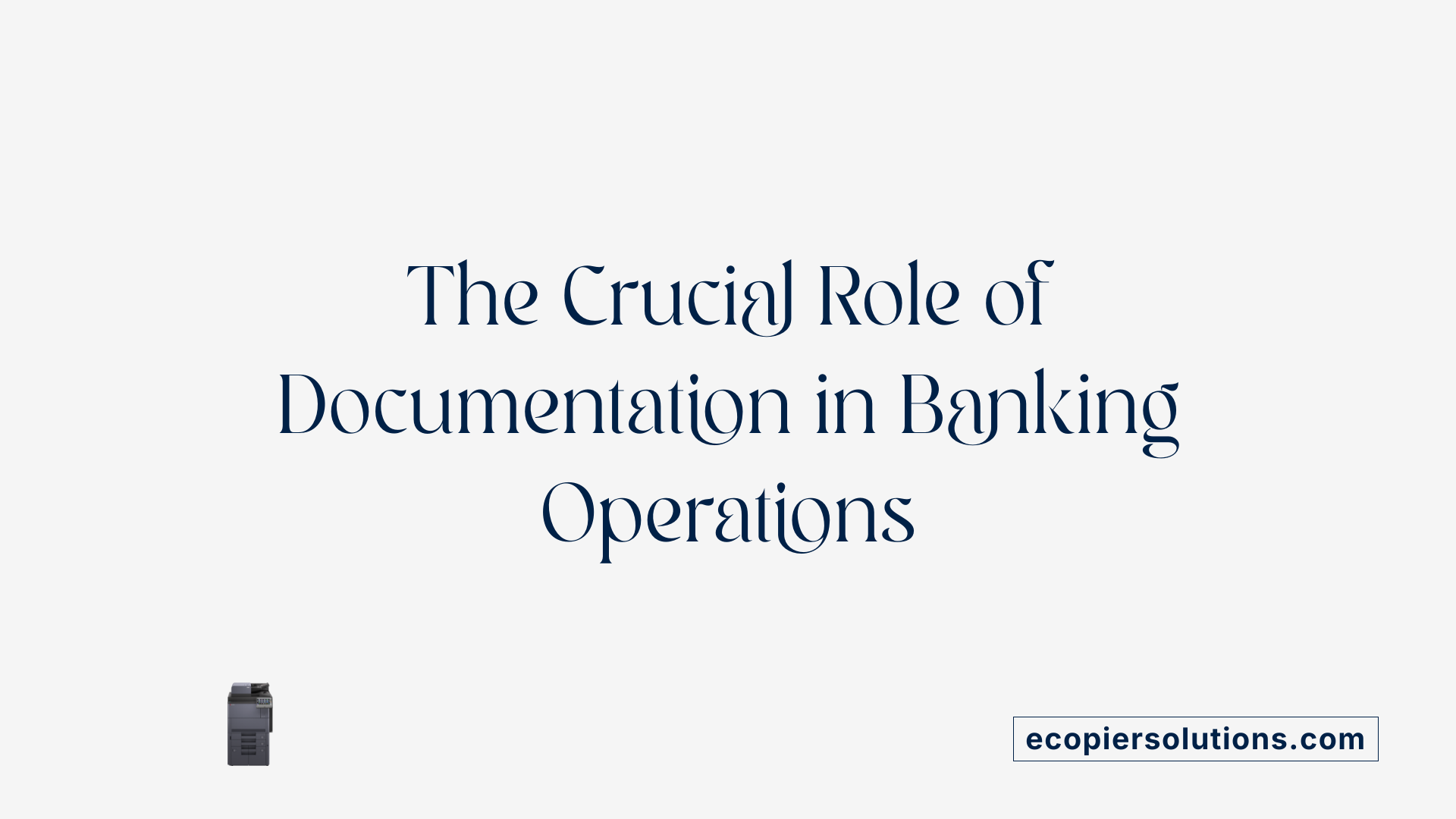Introduction
In the ever-evolving world of financial services, managing vast amounts of documents efficiently and securely is paramount. Document Management Systems (DMS) have emerged as pivotal tools in this regard, helping financial institutions streamline operations, enhance compliance, and improve customer satisfaction. This article delves into the significant role that DMS plays within the financial sector, highlighting the benefits, challenges, and best practices associated with document management.
Understanding Document Management Systems in Finance

What is a DMS in finance?
A Document Management System (DMS) in finance is a crucial tool for banks and credit unions that allows for the electronic receiving, tracking, management, and storage of documents, moving away from paper-based systems. It enhances efficiency by automating workflows, document tracking, and exception handling, which helps reduce administrative burdens on employees.
Role in digital transformation
The significance of a DMS extends beyond mere document storage; it plays an essential role in the digital transformation of financial institutions. Features such as automated alerts for expired documents and integration with enterprise content management systems ensure smooth operations and compliance with document retention policies. Moreover, transitioning to a DMS provides security enhancements like encryption and access controls, safeguarding sensitive financial data.
Integration with financial processes
A well-organized DMS not only improves document accessibility but also supports customer satisfaction and operational efficiency. By centralizing document management, it allows for seamless collaboration among team members and partners, significantly reducing time spent on document retrieval. This integration streamlines processes such as loan applications and compliance audits, further showcasing how vital a DMS is for effective financial operations.
Importance of Documentation in Banking

Why is documentation important in banking?
Effective banking documentation and information processing are essential for several reasons. First and foremost, these processes directly impact operational efficiency. A robust Document Management System (DMS) enables financial institutions to streamline workflows, ensuring that critical information can be accessed quickly and securely. This reduction in retrieval time enhances productivity since employees waste less time searching for documents.
Additionally, accurate documentation plays a crucial role in compliance with numerous regulations in the financial sector. For instance, adhering to guidelines set by regulatory bodies helps banks avoid hefty fines and legal issues. This is particularly pertinent given the increasing scrutiny on financial institutions regarding data governance and retention policies.
Finally, good documentation fosters strong relationships with banking partners. By maintaining comprehensive and accessible records, institutions can communicate effectively and promptly with stakeholders, enhancing trust and cooperation. Overall, maintaining meticulous documentation is not just about compliance; it's a central pillar to financial stability and growth.
Document Management in Banking: A Core Component of Operations

What is document management in banking?
Document management in banking refers to the systems and processes that financial institutions use to collect, organize, track, and retain information about customers, accounts, and operations. This encompasses compliance with retention schedules, even for accounts that have been closed.
Given that different types of accounts, such as simple checking accounts and residential mortgages, have varied documentation needs, a tailored approach is necessary.
System processes and organizational impact
Document management systems (DMS) centralize documents, allowing for faster retrieval and better tracking of information. This positioning is crucial for operational efficiency, as it minimizes the time employees spend searching for documents—averaging around two hours each day. By automating workflows, DMS helps reduce bottlenecks and accelerates processes like approvals and audits.
Compliance and risk management enhancement
Furthermore, a robust DMS ensures that financial institutions can meet strict regulatory requirements. This includes proper documentation for audits and maintaining audit trails, which track changes and provide necessary accountability. By implementing effective document management, banks not only mitigate risks associated with data breaches but also enhance their capacity to respond to regulatory scrutiny and safeguard sensitive client information.
Features and Benefits of Document Management Systems

Security and Compliance Management
Document Management Systems (DMS) play a crucial role in ensuring the security and compliance of sensitive information within financial services. They efficiently implement robust security measures such as encryption, multi-factor authentication, and access controls, thus safeguarding client and corporate data from unauthorized access. Such systems maintain regulatory compliance by ensuring secure data capture and retention, helping organizations meet critical standards like PCI and Dodd-Frank.
DMS also simplify audits by providing accurate records and tracking changes made to documents. This creates reliable audit trails essential during financial audits, significantly lessening the risk of legal issues resulting from poor documentation practices.
Cost Reduction and Efficiency Improvements
In addition to enhancing security, a DMS leads to substantial cost reductions for financial organizations. By shifting from paper-based systems to digital formats, institutions can save an estimated $5 per document through decreased printing, mailing, and storage expenses. This transition accelerates document processing cycles with features like co-mingled scanning and automated sorting. Consequently, financial teams can retrieve documents more quickly, improving overall productivity.
By automating workflows, DMS reduces manual errors and administrative burdens, allowing staff to focus on strategic tasks instead of repetitive paperwork. The result is not just improved cost efficiency but also enhanced collaboration, enabling teams to work seamlessly, regardless of location.
Best Practices for Effective Document Management in Financial Institutions

Adoption Strategies and Integration
To ensure effective document management, financial institutions should prioritize strategies that facilitate smooth adoption of DMS. This includes choosing a system that integrates seamlessly with existing software and workflows. Training sessions for employees help familiarize staff with the system's capabilities, boosting acceptance and reducing resistance. Additionally, establishing clear workflows tailored to the team's operational needs is critical for maximizing efficiency.
Security Protocols and Compliance Measures
Implementing robust security protocols is essential in protecting sensitive financial data. Organizations should utilize encryption standards, multi-factor authentication, and role-based access controls to maintain confidentiality. Regular audits and updates to compliance measures help institutions stay aligned with regulations such as GDPR and FINRA. This proactive approach not only secures data but also minimizes legal risks associated with document management.
Improving Customer Service with Document Management Systems
Enhanced Accessibility and Resolution Capabilities
Document Management Systems (DMS) significantly enhance the ability of financial institutions to provide swift customer service. By facilitating quick access to crucial documents, staff can resolve inquiries more efficiently. When all documents are digitally stored, meta-tagged, and searchable, employees save valuable time, allowing them to address client needs promptly.
Moreover, with the integration of advanced security features such as encryption and access controls, sensitive information remains protected while being readily available. This balance of security and accessibility is essential for maintaining client trust.
Integration with Customer Service Processes
A DMS streamlines workflows necessary for customer service operations. Automated document handling, such as routing approval requests or financial documents, ensures that staff can focus on strategic tasks instead of getting bogged down in manual data entry.
Furthermore, the DMS can integrate seamlessly with existing customer relationship management (CRM) systems, providing a comprehensive view of customer activity. This unified approach not only improves communication among teams but also fosters better decision-making, leading to enhanced service delivery and overall customer satisfaction.
In essence, the efficiency and security that a robust DMS offers are pivotal for meeting the evolving demands of financial service consumers.
Tackling Challenges: Overcoming Document Management Issues in Finance
Common Difficulties and Solutions
Financial institutions encounter several common challenges related to document management. One major issue is the volume of documents processed annually, leading to inefficiencies in retrieval and increased bottlenecks. Companies often consume up to two hours daily searching for documents, emphasizing the need for efficient systems.
To combat these problems, implementing a Document Management System (DMS) is essential. A robust DMS automates workflows, enabling tasks such as document approvals and data entry to be completed more swiftly.
Adapting to Regulatory Changes
The regulatory landscape in finance is ever-evolving, with requirements from organizations like the SEC necessitating strict adherence to compliance standards. Current systems often lack flexibility, which complicates adapting to new regulations.
DMS platforms are designed to help organizations stay compliant by providing specific features for audit trails and document retention policies. This adaptability leads to better protection against legal ramifications that stem from violations, thus enhancing overall operational stability.
Addressing these challenges through modern document management solutions helps financial institutions improve efficiency while maintaining compliance, ultimately fostering a better organizational framework.
Conclusion
Document Management Systems are indispensable in the financial services sector, providing robust solutions to the complexities of document storage, compliance, and customer service. As financial institutions navigate an increasingly digital and regulatory-focused landscape, the adoption of efficient DMS practices will continue to be pivotal in ensuring operational success and fostering client trust.
References
- Document Management Systems 101 for Financial Services
- Document Management Solutions in Banking - 4 Major Benefits - IBML
- What is a Document Management System in Banking? - Alogent
- What You Need to Know About Document Management Systems ...
- Financial document management guide - ShareFile
- Document Management For Financial Services | iManage
- Financial Services Document Management Dos and Don'ts
- Why Document Management Matters in Financial Services































